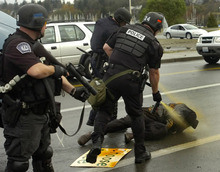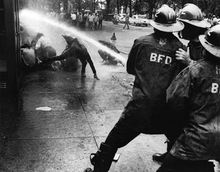I am of the mind that we have progressed, as a nation, considerably over the past 50 years as it pertains to race relations. I'm tired of talking about racism. In fact, I am sick and tired of talking about racism - but I have no choice. The past couple of weeks have evidenced that racism is alive and thriving within our American culture.
The Civil Rights Acts, Voting Rights Act, Fair Housing Act and other laws have made discrimination illegal in the United States. However, it is NOT illegal to be a racist.
What is racism: a belief or doctrine that inherent differences among the various human races determine cultural or individual achievement, usually involving the idea that one's own race is superior and has the right to rule others.
What is discrimination: the unjust or prejudicial treatment of different categories of people or things, especially on the grounds of race, age, or sex.
 Slavery in America existed hundreds of years ago and many of our children, my children included, cannot truly grasp the notion that people were kidnapped, forced to work without pay, beaten, raped, and dehumanized based on the color of their skin. It is hard for them to conceptualize that people who look like their best friends, their grandparents and their step-siblings, would be part of a self-appointed, elite race that would imprison, enslave and murder innocent people. Although they learn about slavery, to varying degrees, it is beyond their ability to really grasp its travesty, gravity, and significance.
Slavery in America existed hundreds of years ago and many of our children, my children included, cannot truly grasp the notion that people were kidnapped, forced to work without pay, beaten, raped, and dehumanized based on the color of their skin. It is hard for them to conceptualize that people who look like their best friends, their grandparents and their step-siblings, would be part of a self-appointed, elite race that would imprison, enslave and murder innocent people. Although they learn about slavery, to varying degrees, it is beyond their ability to really grasp its travesty, gravity, and significance.
Yet, just 50 years ago, during the civil rights movement, many chose to protest nonviolently and sometimes violently, to have the right to freely eat and drink where they desired, to be educated equally and side-by-side with White students, to vote freely and to marry someone of the White race. As my 12 year old daughter watched the protests of the Ferguson grand jury decision, she said to me, "mommy, this reminds me of the black-and-white pictures we see in our school books of police officers beating African-Americans". Her simple statement was profound, true and eye opening. When I watched the news of the protests in the streets of Ferguson, Missouri, I was transported back to a time before I was even born - a time of blatant racism and discrimination. The images looked the same because the fight IS the same.

I actually hate to discuss racism because a part of me wishes it would go away but it just won't. I grew up attending schools where the percentage of African-Americans was very small. However, I never really noticed the racial disproportions, and more importantly, I never felt discriminated against nor isolated. Maybe my perception, and more importantly, my hopes, regarding racism have always been predicated on my life experiences, wherein, I heard and read more about racism and discrimination, than I ever felt it.
Now, I'm old enough to know, that whether I saw it or not, I missed opportunities I should have had. I was not invited to events that I deserved to attend. I was shielded from situations by my parents that I may never know about. Case in point regarding my naivety: I didn't know my very good friend's parents were racist until she wanted to date a Black man as a young adult and they disowned her. I thought, "how could they be so nice and welcoming to me as a teenager, yet simultaneously, view a Black man unworthy of their daughter." Ah-ha! The complicated reality of racism in our society.
Racism and discrimination have been a part of the American culture from the moment colonization began. In fact, slaves were in Jamestown, Virginia in 1619, before the pilgrims landed on Plymouth Rock in 1620. European settlers aka: "THE MAN", needed strong skilled laborers to take care of their ill-gotten land. They traveled to West Africa, where they once traded for gold to now trade for slaves. The Europeans made more than 54,000 voyages to trade and steal human beings and sent at least 10 to 12 million Africans to the Americas. To further crystallize how slavery has been ingrained in America culture, please note: Africans were enslaved for more years in America than African-Americans have been free in this country.
Racism and discrimination is what America was built upon. It's the foundation of everything that is American. Yet, the tremendous strides African-Americans have made as leading contributors in America's growth, despite the obstacles of racism and discrimination, is nothing short of amazing. African-Americans have created some of the most important inventions in history; we hold the most powerful positions the world; and we are celebrated as leading educators, doctors, lawyers, artists, philanthropists.
We, as African-Americans, at this time in history, have the greatest opportunities for advancement and success ever afforded people of color. Yet, in the backdrop of all this pride and privilege, we also have the greatest chance of being profiled based on our race. We have the greatest chance of being incarcerated based on non-existent, trumped up or menial charges. We have the greatest chance of being unemployed or under-employed. We have the greatest chance of being killed by police officers. Statistics show, young black males in recent years were at a 21 times greater risk of being shot dead by police than their white counterparts, according to a ProPublica analysis of federally collected data on fatal police shootings.
I hate talking about racism, but when two unarmed, young black men are killed by two white police officers and the case never gets before a trial jury - it is my charge to talk about racism. Michael Brown and Eric Garner were killed for small crimes and neither of the officers will be held criminally accountable for their conduct. The prevalent systematic expression of passive-racism cloaked as "justified deadly force" and "the grand jury process" is so unsettling that Blacks, Whites, Hispanics, Asians and others are protesting in the streets of the inner cities, the suburbs, university campuses and even around the world.
A grand jury is typically considered a tool for prosecutors, who have the authority to offer a particular version of a story, in a secretive setting, and aren't required to present evidence that could exonerate the accused. The grand jury's sole task is to determine if there is reasonable cause to proceed with charges. This is traditionally a very low bar for a prosecutor to hurdle. This one-sided proceeding is so beneficial to the prosecutor that in 1985, Chief Judge Sol Wachtler, stated a grand jury would 'indict a ham sandwich,' if that's what you wanted.
Officer Wilson's actions, in shooting and killing Michael Brown, might not have been racially motivated but what about Prosecutor Robert McCulloch's actions? It is very clear that the prosecutor did not want a trial jury to hear this case and may have practiced prosecutorial misconduct by allowing his Assistant Prosecuting Attorney Kathy Alizadeh to allegedly mislead the grand jury, thus, ensuring Wilson would not be indicted. The prosecutor apparently did not think the life of a young black man mattered enough to allow a trial jury to determine Officer Wilson's guilt or innocence.
Eric Garner's killing case was heard before a grand jury in Staten Island, where he lived. Staten Island is New York City's most conservative, least populated and "by far, the city's whitest borough." Staten Island has a history of trumped-up arrests of Black males. In one case, former officer Michael Daragjati pleaded guilty in Brooklyn federal court to depriving Kenrick Gray of his civil rights where he fabricated a charge of resisting arrest, caused Mr. Gray to spend three nights in jail and bragged to his friends that he, "fried another n-----." Daragjati was sentenced to 57 months in jail.
The District Attorney, Dan Donovan, convened a Staten Island grand jury and went on to present 50 witnesses and 60 pieces of evidence. Additionally, he allowed Officer Daniel Pantaleo to testify for over two hours about Mr. Garner's July 17 death, wherein the officer explained to the jury why the homicide was justified. To the outsider this sounds reasonable. But as Daniel Medwed, professor of law at Northeastern University said, "That sounds very objective and fair, but ordinary grand jury indictments are not objective and fair." He continued, "Why should police officers be treated differently?"
Chief Judge Wachtle, in all his wisdom, in a attempt to make prosecutors more accountable for their actions, in 1985, proposed that the New York state eliminate the grand jury system of bringing criminal indictments. Under Wachtler's proposal, a district attorney would present some of his evidence directly to a judge at a preliminary hearing to determine whether a suspect should have to stand trial. He believed that bypassing the grand jury, the state would save time and money, and would protect the rights of the accused. Abolishing the grand jury system would require a state constitutional amendment, which would have to be approved by the Legislature and by voters at a referendum.
This idea is not novel and is practiced in many states. Many states rely on preliminary hearings as a means to check a prosecutor's abuse of power and thwart covert-racist agendas. The preliminary hearing is completely transparent, unlike the grand jury. It is recorded, the accused is present, and a judge decides if there is enough evidence to go a trial. The bar for indictment is very low. Consequently, the majority of charges lead to an indictment. Thereafter, a trial jury can decide the innocence or guilt of the defendant as the 6th Amendment of United States Constitution intended.
Racism is not going away anytime soon. But from the multicultural landscape of protesters, it is clear that the racist is the "minority" -- finally. The Michael Brown and Eric Garner cases force us to have the tough talks about race, profiling, police use of deadly force, judicial abuse of power and potential changes to our grand jury systems. Although I'm sick of talking about racism, I more disgusted and nauseated when I see young Black men unjustifiably killed and no one is held accountable. BLACK LIVES MATTER!